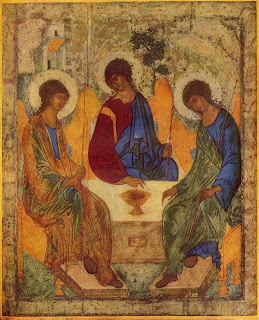Why I Believe in the Holy Trinity, Part I
 Growing up with Jehovah's Witnesses for grandparents, and a father who had come of age within that organization, I have known since I was very young that JW's do not believe in the divinity of Christ. In the last few years I've had discussions with my grandfather about the Godhead, and I was even invited for a Sunday service at his Kingdom Hall where he preached a message about the deception and wickedness of the Trinity doctrine. Knowing this difference, I have tried all my life to combat it, and find a way to convince
Growing up with Jehovah's Witnesses for grandparents, and a father who had come of age within that organization, I have known since I was very young that JW's do not believe in the divinity of Christ. In the last few years I've had discussions with my grandfather about the Godhead, and I was even invited for a Sunday service at his Kingdom Hall where he preached a message about the deception and wickedness of the Trinity doctrine. Knowing this difference, I have tried all my life to combat it, and find a way to convincethose who do not hold to this doctrine. Obviously I turned to the scriptures, but...
I soon found that I wasn't smart enough to put together enough proof texts to convince my grandfather because for every verse that I brought forth (fictitiously - I've never actually debated this in depth with anyone), he could bring another scripture which would seem to say the very opposite.
- Christ says "I and the father are one"
- Christ also says "But of that day and hour no one knows, not even the angels in heaven, nor the Son, but only the Father."
- John writes that "In the beginning was the Word, and the Word was with God, and the Word was God."
- But Paul writes "He is the image of the invisible God, the firstborn over all creation."
These thoughts have bothered me for some time. I have listened to dozens of preachers prove the doctrine of the Trinity through proof texts from the scripture, arguments from logic, and appeals to reason. Nothing ever really satisfied me though, because my grandfather had verses from scripture, arguments from logic, and appeals to reason as well. The two sides seemed to be butting heads. I finally resolved to say that the trinitarians had their group of verses they used, and the non-trinitarians had another group of verses they used, each one explaining how their group of verses were the clearer passages and the other verses needed to be interpreted in that light.
But as trinitiarians, we were right. Right?
(End of Part I)